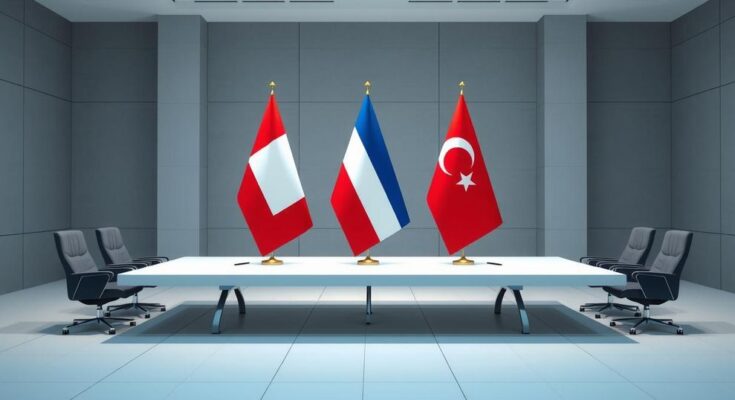Negotiations in Saudi Arabia for a potential Ukraine ceasefire were held from March 23-25, involving separate meetings between U.S., Ukrainian, and Russian delegations. Key focus areas included energy infrastructure security and maritime safety in the Black Sea. Although no joint statement was released, parties indicated progress and expressed hopes for future agreements.
Recent negotiations regarding a potential ceasefire in Ukraine took place from March 23-25 in Riyadh, Saudi Arabia. Separate meetings were held between the U.S. delegation and Ukrainian as well as Russian teams. Although no joint statements were released, detailed discussions were shared among the involved parties.
Key discussions in Riyadh involved technical teams rather than direct participants. The Ukrainian delegation was led by Defense Minister Rustem Umerov and included military personnel and infrastructure specialists. The U.S. delegation featured Senior Director Andrew Pick and State Department Official Michael Anton, while the Russian side included Grigory Karasin and FSB Advisor Sergey Beseda.
The agenda included the U.S. proposal for a temporary ceasefire, addressing cessation of attacks on energy infrastructure and restoration of maritime security in the Black Sea. In previous discussions, the U.S. proposed a 30-day complete ceasefire, which Ukraine accepted, while Russia expressed a willingness for a pause in strikes on energy targets alongside restoration of the Black Sea Initiative. Additional conditions from Russia included halting mobilization and ceasing supply of Western weapons to Ukraine.
The Ukrainian side assessed the first negotiations positively, focusing on energy sector issues. Reports indicated essential discussions on Black Sea shipping security, especially regarding key ports in Odesa and Kherson. Advisor Serhiy Leshchenko emphasized that Ukraine could ensure responsibility for maritime security if Russia displays goodwill toward peace.
The second negotiation round on March 25 required feedback from Ukraine on the conversations between the U.S. and Russia. Deputy Head of the Presidential Office, Pavlo Palisa, indicated that joint statements typically follow political negotiations. Details about a joint statement were unresolved and could be addressed later.
Despite expectations for a joint statement following U.S.-Russia discussions on March 24, Kremlin spokesperson Dmitry Peskov confirmed that it would not occur due to the technical nature of the talks. He mentioned that findings from the consultations were analyzed in Moscow and Washington. However, the Kremlin later accused Ukraine of not approving a final statement.
Russian Foreign Minister Sergey Lavrov claimed the talks focused on Black Sea navigation safety, emphasizing Russia’s position on restoring the Black Sea Initiative without ambiguity. Karasin described the negotiations as intensive and constructive, highlighting the need for international involvement in future discussions.
The U.S. has yet to issue official statements on the negotiations, though reports indicate a positive assessment of progress toward a ceasefire. White House sources suggest that Ukraine and Russia may be closer to a ceasefire than previously assessed, with discussions centered on expanding ceasefire initiatives in the Black Sea region.
The recent negotiations in Saudi Arabia marked a significant step in the ongoing discussions for a potential ceasefire in Ukraine. Both the U.S., Ukraine, and Russia engaged in extensive dialogues focusing on energy infrastructure and Black Sea security. While no joint statements were issued, the involved parties expressed cautious optimism about future agreements. The discussions underscore the complexity and evolving nature of international relations surrounding this conflict.
Original Source: newsukraine.rbc.ua




